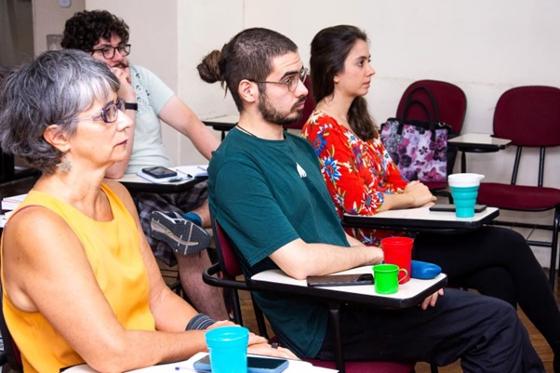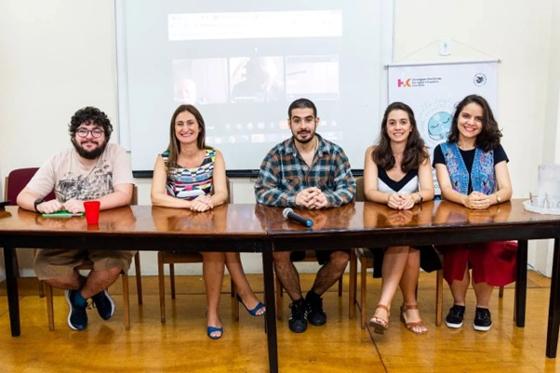From the Arctic to Brazil: reflections of Apostolos Tsiouvalas
Symposium and Workshop: “An Exchange Program on Empathy, Compassion, and Care in Water Governance, from the Perspective of Integral Ecology – (ECO_CARE) Brazil- Norway”
By: Apostolos Tsiouvalas, PhD Fellow, Norwegian Centre for the Law of the Sea (NCLOS), UiT The Arctic University of Norway, Tromsø, Norway apostolos.tsiouvalas@uit.no
The overall aim of this report is to provide a summary of the hybrid Symposium and Workshop held at the Rural Federal University of Rio de Janeiro (UFRRJ) on December 7 and 8, 2022, as part of the “An Exchange Program on Empathy, Compassion, and Care in Water Governance, from the Perspective of Integral Ecology” (ECO_CARE) program. The event coined the first round of the ECO_CARE project's exchange mobility between UiT The Arctic University of Norway and UFRRJ and invited an array of contributions by both graduate students and academic employees to share their research on law, emotions, and water governance through interdisciplinary methodological approaches. The report shares the main insights generated through this two-day event and is divided into four sections: 1. Introduction; 2. Symposium; 3. Workshop; 4. Ways forward
1. Introduction
Bringing together research and education from Norway and Brazil, the ECO_CARE project seeks to rethink and reinterpret water rights through emotions, with a focus on ‘empathy’ (ability to comprehend and share the feelings of others), ‘compassion’ (ability to feel together), and ‘care’ (ability to take restoring actions). In light of this methodological lens, the project’s overarching goal is to enhance the study programs in both states and develop ground-breaking research with an innovative model of collaborative water governance, built with a platform on critical legal and community-based research, from the perspective of integral ecology. The two-day Symposium and Workshop held in Rio de Janeiro constituted the beginning of the exchange mobility of students among ECO_CARE’s institution members and brought along perspectives from scholars researching in an Arctic, Latin American and global water governance context. The first day of the event focused on research dissemination between the project’s senior researchers, while the second one comprised of a student workshop that facilitated a first in-person contact and academic dialogue between the program’s exchange students. The dissemination of the project results, as well as this Symposium and Workshop aimed at having societal, environmental, and scientific impacts aligned with the Horizon Europe Strategic Plan 2021-2027 and Agenda 2030.
2. Day One: Symposium
The first day of the event started with a welcome speech by Prof. Fatima Portilho, Coordinator of the Graduate Program in Social Sciences in Development, Agriculture, and Society (CPDA) affiliated with UFRRJ, Prof. Peter Herman May (CPDA/UFRRJ) and Prof. Andrey Cordeiro Ferreira (CPDA/UFRRJ). The three of them stressed the importance of this mobility program between institutions in Brazil and Norway and reflected on the value of emotions in re-thinking global water governance as well as ECO_CARE’s overall ambition to bridge researchers across the globe. Subsequently, Prof. Giulia Parola, Principal Investigator of the ECO_CARE presented the event’s comprehensive agenda and gave practical information to the symposium and workshop’s online and in-person participants. Prof. Parola further shared ECO_CARE’s main deliverables so far, as well as the program’s plans for the semesters to come. Following Parola’s introduction, Prof. Rodrigo Tavares legal philosopher and professor at PPGIHD/UFRRJ delved into the crossroad of ‘law and emotions’ and explored the causational relationship between law-making and emotions in the context of water governance. Subsequently, interlacing ‘emotions’ with ‘motion’ and problematizing the main epistemological beliefs underpinning Western legal thinking, Apostolos Tsiouvalas, Ph.D. Fellow at the Norwegian Centre for the Law of the Sea (NCLOS) affiliated to UiT The Arctic University of Norway, presented his ongoing Ph.D. research on ‘law of the sea and motion’ and drew lessons from Arctic Indigenous (Inuit) thinking on ‘motion’ experiencing the complex oceanic socioecological systems. A discussion between the panelists followed, critically reflecting on how emotions can communicate insights into water law and governance as well as academic synergies between researchers from the Arctic to the southern hemisphere. The symposium concluded the first day of the event with two book launches by the project participants at the office of Editora Multifoco publishing house. Prof. Giulia Parola and Prof. Margherita Paola Poto presented their recent book The Escazú Agreement in Comics with and for the Chiquitano People. A co-created project of legal design and visual law and Prof. Rodrigo de Souza Tavares, launched his book titled Direito e Emoções: uma análise sentimentalista das relações entre direito e moral.

Figure 1. Symposium. From the left: Prof. Fatima Portilho, Danilo Augusto Ricco, Apostolos Tsiouvalas, Cecília Silvia Campos
3. Date Two: Workshop
The second day of the workshop opened the floor for graduate students who had the opportunity to present their ongoing research projects at master’s and doctoral level and discuss their theses along with fellow-students from different institutions as well as senior researchers attending in-person and online. The workshop started with a brief introduction by Prof. Giulia Parola, setting the scene for seven presentations by graduate students. Following Prof. Parola’s introduction, Apostolos Tsiouvalas, Ph.D. Fellow at the Norwegian Centre for the Law of the Sea (NCLOS) of UiT The Arctic University of Norway, gave a presentation on Arctic Governance, Law and Geopolitics, introducing the audience to the main pillars of water governance in the Arctic region and touched upon the region’s ongoing legal and geopolitical realities in light of climate change. Subsequently, Danilo Augusto Ricco, master’s student at CPDA/UFRRJ, presented his thesis Red Stains in Blue Seas: Whaling regulation and compatibility under the logic of capital. Ricco delved into international whaling law and problematized the neoliberal nature of marine biodiversity governance under Western legal-spatial thinking. In turn, Cecília Silvia Campos, master’s student at PPGD/UNIRIO shifted the discussion’s focus from the ocean ecosystems to freshwater governance and discussed sanitation and waste management policies in the Brazilian Costa do Sol in light of the ever-evolving concept of ‘blue economy’. Opening up the discussion to interdisciplinarity and how jurisprudence can be benefited by non-traditional legal methodological lenses, Aline da Silveira Matos master’s student at PPGIHD/UFRRJ presented her own research on computational linguistics and water rights. Da Silveira Matos introduced the audience to the digital humanities field and discuss the value of artificial intelligence tools in legal research.
After a short break and drawing on the previous presentations, Apostolos Tsiouvalas took the floor again and contextualized Arctic and global south perspectives, yet this time by placing focus on the rights of (Arctic) Indigenous peoples as subjects of both marine and fresh/water governance. Interethnic struggles for water rights, land and territory constitute important stressors in the relationship of indigenous communities and state instruments in Brazil, fact that was further addressed in the following presentation by Mariana Homem de Mello Reinach PhD Candidate at CPDA/UFRRJ. Finally, Cledisson Geraldo dos Santos Junior, PhD candidate at CPDA/UFRRJ, touched upon cosmopoetics of the waters and the Vazanteira´s cosmopolitics, presenting his own PhD research on visual anthropology pertinent to artisanal fishers from the North of Minas Gerais, Brazil. The workshop concluded with a discussion and Q&A session, where the students exchanged views on their ongoing research projects, drew synergies between their different case studies addressed during the workshop, and received feedback from the senior researchers attending the event.

Figure 2. Student Workshop. From the left: Danilo Augusto Ricco, Prof. Giulia Parola, Apostolos Tsiouvalas, Cecília Silvia Campos, Aline da Silveira Matos
4. Ways forward
Overall, the Symposium and Workshop: “An Exchange Program on Empathy, Compassion, and Care in Water Governance, from the Perspective of Integral Ecology – (ECO_CARE) Brazil- Norway” provided an avenue for dialogue between legal scholars and students from Norway and Brazil. Much like the Arctic, the status quo of water ecosystems in Latin America - in particular the Amazonia - has garnered international attention when it comes to environmental changes, ecological disasters and indigenous cultures vis-à-vis state and commercial interests. Drawing parallels between the North and the southern hemisphere in the context of water governance and rethinking existing environmental issues through the lens of emotions might be consistent with a critical re-imagination of the hydrosphere’s future. The ECO_CARE coined an undergoing process of disorienting environmental law and water governance from its theoretical biases and paving the way for critical legal scholars to rethink marine and freshwater legalities in light of emotions. To continue this ongoing ambition and transnational as well as transdisciplinary dialogue, in 2023 the ECO_CARE student exchange mobility has continued with the first round of students from Brazil arriving at UiT The Arctic University of Norway.
***
This post can be cited as: Apostolos Tsiouvalas, Symposium and Workshop: “An Exchange Program on Empathy, Compassion, and Care in Water Governance, from the Perspective of Integral Ecology – (ECO_CARE) Brazil- Norway”, January 20, 2023, online: here
For a follow-up of Apostolos' journey to Brasilia see our ECOCARE Instagram channel